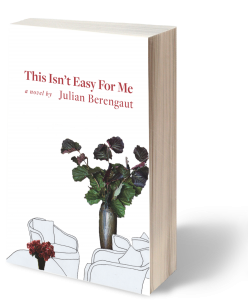Author Spotlight
This Isn’t Easy for Me by Julian Berengaut
 Julian Berengaut’s new novel, This Isn’t Easy for Me, a story told entirely in dialogue, is available today. Jen Michalski had some nice words for it:
Julian Berengaut’s new novel, This Isn’t Easy for Me, a story told entirely in dialogue, is available today. Jen Michalski had some nice words for it:
“In Julian Berengaut’s This Isn’t Easy for Me, two strangers—Sabine, a German physicist, and Renata, an economist and philanthropist—meet for tea, one with a confession, the other a proposition. What follows is not a novel, but a conversation—a conversation that becomes more than a novel. It is a sweeping look at history, love and relationships, science, mathematics, and most importantly, women. Berengaut has written Sabine and Renata with as much tenderness, respect, and understanding as any woman writer.”
—Jen Michalski, The Tide King and Could You Be With Her Now
So did Linda Franklin:
“… here’s a book for people who love language. Language of literature, but also of physics, history, and the tangles you make with the daily news and private memories. Inside here is sex and sin and religion and dietary restrictions. This Isn’t Easy for Me is also for people who wish they could let their minds go wild—because by the end of the book, they will. From Conan Doyle to Pushkin, from Diderot to Godel, from Jewish jokes to Dumas to the Bible to Babel, bring some sticky notes for this lively marathon conversation between two learned women, so you can jot all the words, books, and your own ideas that you’ll want to follow up on later. The only problem here is that, as much as wish you could be, you aren’t there to join in.”
—Linda Franklin, Barkinglips
Tags: Julian Berengaut

On what percent of the pages of the book do they not talk about men?
The all dialogue novel seems to be a trend now. Didn’t Eggers recently publish an all dialogue novel? Doubt I could motivate myself to read 250 pages of straight dialogue, and I love dialogue.
But half of what makes dialogue work in fiction is the non-dialogue around it. The gestures. The sensory descriptions of place. And since you can’t cram what would normally appear in exposition and description into dialogue without ruining the dialogue, what’s the point? Why not just write a play? Won’t the novel feel shallow, like the tip of the iceberg with nothing the surface? If you read a dialogue-heavy story like “Hills Like White Elephants,” you acknowledge the dialogue’s effectiveness while understanding that it would be much less effective without the gestures and physical descriptions.
J R
A wikipedia page:
http://en.wikipedia.org/wiki/J_R
Thanks. I’ll check it out.
Good question.